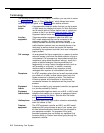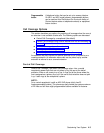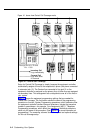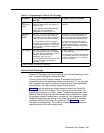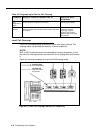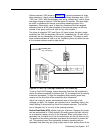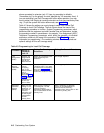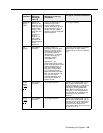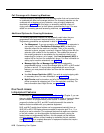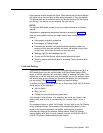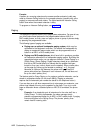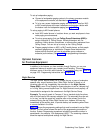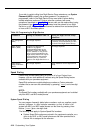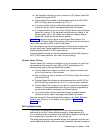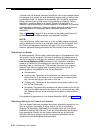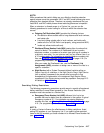
Call Coverage with Answering Machines
Personal answering machines are a call coverage option that can be used alone
or combined with other call coverage solutions. An answering machine can be
combined with a telephone at any extension, using a bridging adapter as
described on page 2-5. With this setup, an answering machine covers all
ringing calls on an extension (on both primary and secondary lines). For more
details on connecting personal answering machines, see page 7-5.
Additional Options for Covering Extensions
The following equipment features can be especially useful when they are
programmed onto equipment feature buttons for covering extensions.
Programming procedures are explained in detail in Chapter 5.
■
Fax Management.
If you are connecting a fax machine to an extension in
your system, first use
Fax Machine Extensions (#601)
to identify the
extension where the fax machine is installed. Then, on the covering
extension’s phone, program a one-touch Intercom Calling button with the
extension jack number for the fax machine. This enables the person at
the covering extension to see whether the fax machine is busy or not
responding (for instance, out of paper). Use
Line Assignment (#301)
to
remove the fax line from the receptionist’s phone. For more information on
setting up fax machine extensions, see page 7-1.
Message Light On
and
Message Light Off
can be assigned to
programmable buttons, to turn the message lights on MLS- or MLC-model
phones on and off. (To use a button programmed with one of these
features, you must press that button and then dial the extension jack
number.)
Use
Line Access Restriction (#302)
if you wish to control outgoing calls
on secondary lines. For more information, see page 4-16.
Night Service
must be turned on and off at the receptionist’s phone (the
■
■
■
phone connected to extension jack 10 on the equipment controller). For
more information about Night Service, see page 4-13.
One-Touch Access
to Equipment Features
As discussed in “One-Touch Access to Centrex Services” in Chapter 3, you can
store any dialing sequence—such as Centrex feature codes or frequently-dialed
phone numbers—on programmable phone buttons. In addition, you can
program the buttons on MLS- and MLC-model phones with the codes for
features that are available with your premises equipment.
MLS- and MLC-model phone buttons can be programmed centrally from an
MLS-34D or MLS-12D display phone connected to extension jack 10 or 11, or
directly at a user’s extension. For equipment features that require an extension
or line jack number, you should program the features centrally, storing the
feature codes on programmable buttons—this lets people use the features
simply by pressing buttons, without needing to remember the jack numbers.
(See Appendix B for a complete discussion of equipment features that require
extension or line jack numbers.)
4-10
Customizing Your System



